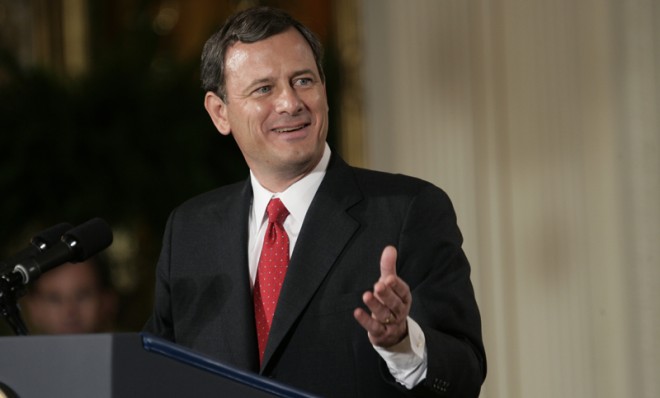Chief Justice John Roberts: The hidden hand behind the surveillance state
The secret court that facilitates Obama's spying program is stacked with the justice's picks


A free daily email with the biggest news stories of the day – and the best features from TheWeek.com
You are now subscribed
Your newsletter sign-up was successful
Defenders of the National Security Agency's sweeping intelligence-gathering operations often turn to a seemingly unassailable argument: Every phone record and every byte of data that the NSA collects has essentially been approved by all three branches of government. That's one of the factors that makes the NSA scandal unique — there is almost zero disagreement within the government itself over the spying program's constitutionality and efficacy.
However, a closer look at the involvement of one of the branches — the judiciary — suggests that this consensus might not be as ironclad as once thought. A report by Charlie Savage at The New York Times reveals that the Foreign Intelligence Surveillance Court — the secret court that decides how far the government can go before its snooping violates the Constitution — may have something of a puppet master: Chief Justice John Roberts of the Supreme Court.
Roberts, Savage says, "has been quietly reshaping the secret court" by packing it with Republican-appointed judges, many of whom are former executive branch officials. Critics say Roberts' selections are more likely than other jurists to defer to the government when it says its domestic spying and data-mining are necessary to protect national security.
The Week
Escape your echo chamber. Get the facts behind the news, plus analysis from multiple perspectives.

Sign up for The Week's Free Newsletters
From our morning news briefing to a weekly Good News Newsletter, get the best of The Week delivered directly to your inbox.
From our morning news briefing to a weekly Good News Newsletter, get the best of The Week delivered directly to your inbox.
Savage and other reporters have noted that Roberts has assigned all 11 of the court's judges, 10 of whom were originally appointed by Republican presidents. The numbers make the government's extremely high success rate at the court appear fishy — and it doesn't help that the secret court only hears one side, the government. Here is a brief excerpt from Savage's article:
Though the two previous chief justices, Warren E. Burger and William H. Rehnquist, were conservatives like Chief Justice Roberts, their assignments to the surveillance court were more ideologically diverse, according to an analysis by The New York Times of a list of every judge who has served on the court since it was established in 1978.According to the analysis, 66 percent of their selections were Republican appointees, and 39 percent once worked for the executive branch."Viewing this data, people with responsibility for national security ought to be very concerned about the impression and appearance, if not the reality, of bias — for favoring the executive branch in its applications for warrants and other action," said Senator Richard Blumenthal, a Connecticut Democrat and one of several lawmakers who have sought to change the way the court's judges are selected. [New York Times]
The article explains that the court began expanding its role under Rehnquist, who died in 2005. During George W. Bush's first term, the surveillance court gave the administration permission to continue surveillance programs that once sidestepped the Foreign Intelligence Surveillance Act. Later, under Roberts, the court's powers expanded when Congress gave the government power to conduct surveillance without warrants on domestic soil (provided the targets were foreigners abroad), and the secretive court was tasked with setting rules for the program.
The effect Roberts has had on the court's decisions is debatable, says Margaret Hartmann at New York. Some say he's making the court more likely to rubber stamp administration requests; others contend it's natural for the government to have a high success rate, because it is not going to make a surveillance request without good reason. "Regardless," Hartmann says, "[Edward] Snowden's leaks have intensified calls to change how the secret court operates."
The question is what kind of system would work better. Blumenthal has proposed allowing the chief judges of the nation's 12 appellate courts to each appoint a judge to the FISC, in the hopes of fostering a diversity of legal opinion.
A free daily email with the biggest news stories of the day – and the best features from TheWeek.com
Gary Schmitt at The Weekly Standard says some lawmakers and legal scholars want to let security-cleared lawyers present arguments to the court against the government's requests.
Schmitt also argues that it's probably best to take the job out of the court's hands entirely, and give it to the intelligence committees in Congress.
The court's current role under FISA allows the executive branch to hide behind judges' robes in the exercise of its power and, in turn, weakens the incentive Congress has to weigh in on these matters. It would be constitutionally healthier if the responsibility for collecting intelligence and overseeing it were handled by the branches best suited to doing so. [Weekly Standard]
Harold Maass is a contributing editor at The Week. He has been writing for The Week since the 2001 debut of the U.S. print edition and served as editor of TheWeek.com when it launched in 2008. Harold started his career as a newspaper reporter in South Florida and Haiti. He has previously worked for a variety of news outlets, including The Miami Herald, ABC News and Fox News, and for several years wrote a daily roundup of financial news for The Week and Yahoo Finance.
